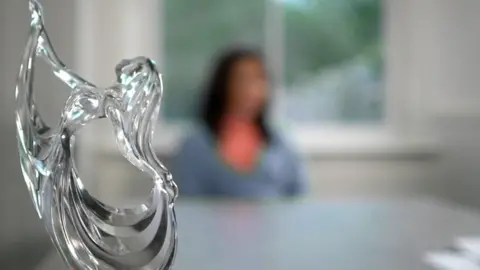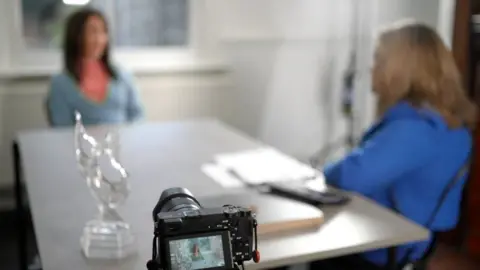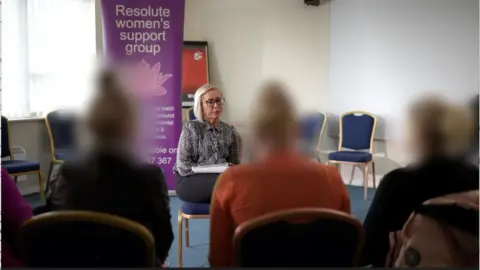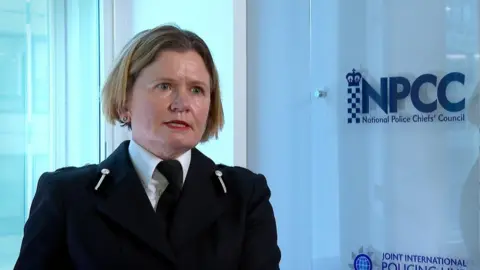Over 1,500 police accused of violence against women and girls
 BBC
BBCMore than 1,500 police officers were accused of violence against women and girls in a six-month period, figures for England and Wales suggest.
But of the resolved cases, only 13 were sacked, according to data from the National Police Chiefs' Council.
Reported offences ranged from sexual attacks to complaints of excessive force by officers during arrest.
Deputy Chief Constable Maggie Blyth, NPCC lead on violence against women and girls, called the data "disturbing".
Speaking to BBC Breakfast, she said a large proportion of the investigations had yet to be completed, but added it did show "we cannot be complacent".
"We need really robust investigations to take forward and dismiss anyone who we think is working in our organisation who shouldn't be and has been found guilty of allegations that are relating to violence against women and girls," she said.
The report follows the cases of:
- serial rapist and former police officer, David Carrick, jailed for violent and degrading sexual offences against a dozen women over two decades
- and former Met officer Wayne Couzens, already serving a whole-life sentence for , sentenced to 19 months in March for indecent assault.
Officers accused
During the six months to March 2022, members of the public made 524 complaints relating to violence against 867 officers.
Of these, 290 cases have been resolved, with nine in 10 ending in no further action.
During the same period, 672 police officers and other staff were reported by colleagues. So far, 167 cases have been dealt with - and, of these, seven in 10 ended in no further action.
The report said the true figures were likely to be far higher because of under-reporting by police staff, and inaccuracies and inconsistencies in data collection across forces.
The figures - for all police forces in England and Wales including the British Transport Police - equate to 0.7% of the total police workforce employed in March 2022, the NPCC said.
One woman who did report her case was Alice, not her real name, who was married to a West Yorkshire Police firearms officer.
She said the force failed to fully investigate her allegations of domestic violence and the whole experience had destroyed her trust in the police.
"I think it's scary, the fact that he's had little control of himself and then been able to go to work and get a loaded gun out and be walking the streets," she told BBC News.

Alice said her former husband claimed her word would never be believed against his - a police officer.
She described West Yorkshire Police's response as an "intentional overlooking of his behaviour".
"I have cited to them extreme controlling and coercive behaviour and no investigation was opened," she told BBC News.
"The reality is, in my case, that it's not taken seriously and it feels as though they cover up for one another.
"It's quite unbelievable that the people that are meant to protect you are the ones that are helping the person who's abused you, and poses a threat to you.
"It's just an exhausting and frightening place to be in."
After speaking to Alice, the BBC contacted West Yorkshire Police. An officer has been suspended and the matter referred to the police watchdog, the Independent Office for Police Conduct.
"While we cannot comment further on this specific matter, we encourage anyone who is a victim of domestic abuse to contact us," said a spokesperson for the force.
"Allegations are taken seriously, including allegations involving West Yorkshire Police officers and staff, and will always be fully investigated."
The NPCC also looked at violence against women and girls generally during the six months to March 2022.
These figures show 447,431 recorded domestic abuse crimes and, overall, at least 507,827 crimes of violence against women and girls.
Similar to other crimes, only 6% of these resulted in charges, and domestic abuse survivors have told BBC News that support from police too often falls short.
In Barnsley, a survivor support group, Resolute, helps women who have suffered domestic abuse.
Its founder, Deborah Jones, told BBC News: "Domestic abuse is destroying women and children's lives on a daily basis."

The BBC spoke to women at a Resolute meeting. All were anonymous for their own safety.
One young woman said she had been covered in bruises on the chest and neck after her abuser tried to strangle her in the street.
A member of the public called the police, but support from officers was "very minimal", she said.
"They didn't even take me back home."
An older woman complained of lack of compassion: "They make you feel like it's your fault for going with this person in the first place."
A shortage of trained officers is a big problem, according to another who said the first police officer she spoke to admitted she had not been trained in dealing with domestic violence, but in firearms. The woman said it was "just horrendous".
In another case, even contacting the investigating officer was a struggle.
"I found out in October who the officer was. I didn't get any more contact from her until January. She didn't respond to any of my messages."
A spokesperson for South Yorkshire Police said the force was "continuously working" to improve its response to domestic abuse, listening to the views of victims and delivering specialist training to staff in direct contact with victims and perpetrators.
"Often victims live in fear behind closed doors and may find it difficult to come forward, which is why we're committed to bringing those responsible to justice and supporting those affected," said the statement.

Responding to the overall figures on police investigations, Ms Blyth said forces should focus investigations "consistently on the behaviour of suspects" and improve the treatment of victims.
"We will only rebuild trust when the public and our staff see results and feel the impact of our actions," she added.
If you or someone you know is experiencing abuse, you can call the freephone, 24-hour National Domestic Abuse Helpline, run by Refuge, on 0808 2000 247. A directory of other women's support services is also available on the End Violence Against Women website.

Have you been affected by the issues in this story? Share your experiences by emailing [email protected].
Please include a contact number if you are willing to speak to a BBC journalist. You can also get in touch in the following ways:
- WhatsApp: +44 7756 165803
- Tweet: @BBC_HaveYourSay
- Upload pictures or video
- Please read our terms & conditions and privacy policy
If you are reading this page and can't see the form you will need to visit the mobile version of the BBC website to submit your question or comment or you can email us at [email protected]. Please include your name, age and location with any submission.
